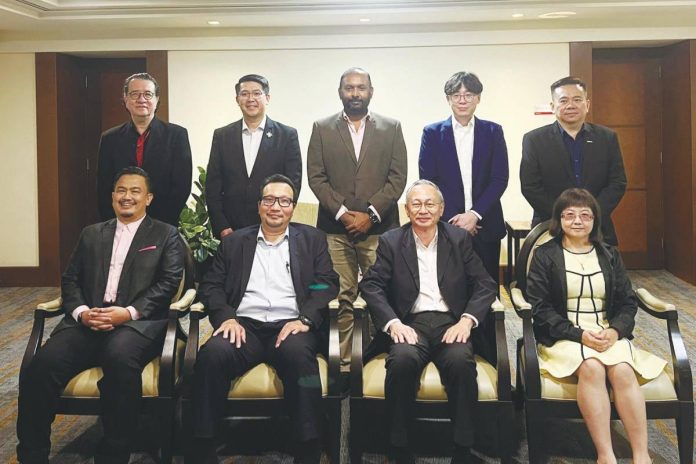KUALA LUMPUR: As Malaysia’s property stock matures, industry players are warning that funding shortfalls and outdated maintenance practices could erode asset values and impose hidden costs on homeowners and investors.
This comes at a critical juncture with a significant share of high-rise condominiums in Kuala Lumpur and Selangor entering major refurbishment cycles without sufficient funds set aside.
To address these concerns, Nippon Paint (Malaysia) Sdn Bhd hosted a roundtable on the “Sustainable Refurbishment of Existing Buildings”, bringing together industry leaders from the Housing and Local Government Ministry (KPKT), the Malaysian Institute of Property and Facility Managers (MIPFM), the Malaysian Institute of Architects (PAM), the Association of Valuers, Property Managers, Estate Agents and Property Consultants in the Private Sector Malaysia (PEPS), the Green Building Index (GBI) and the Royal Institution of Surveyors Malaysia (RISM).
The discussion focused on the two most pressing refurbishment needs facing Malaysian properties today, which are waterproofing and repainting, particularly for properties in the 11–20 year age bracket.
At the heart of the problem is Malaysia’s statutory 10% sinking fund contribution, a formula that was set decades ago and is now unsustainable.
MIPFM member PMGR SR Nageswaran Muniandy explained: “The real challenge starts once a building hits 6–10 years, with waterproofing among the most common and costly issues. By the time properties are over 20 years old, modernisation or full upgrading is often needed. However, with sinking fund contributions capped at 10%, most management bodies can only afford the bare minimum.”
The result is a domino effect whereby deferred works lead to worsening property conditions, which in turn erode property values and investor confidence, a risk that extends beyond individual households.
Panellists also warned that underfunding not only delays essential work but also drives building owners towards low-cost, short-term fixes that fail to address root causes.
Nippon Paint Malaysia senior manager (waterproofing) Aaron Ang shared, “Even the best waterproofing systems will fail if applied poorly or specified incorrectly. For example, waterproofing solutions are often used without addressing the underlying defects, which only postpones the problem rather than solving it. Without stronger standards and enforcement, new buildings can begin leaking within three to five years.
“That’s why at Nippon Paint, we have established a strict waterproofing procedure that includes periodic site inspections and close supervision to ensure proper application. This process safeguards against workmanship errors by enforcing best practices at every stage: pre-maintenance, during maintenance, and post-maintenance – delivering long-term durability and performance. Without these measures, leaks often went unnoticed until they became visible, at which point repairs were more expensive, disruptive, and less effective.”
PAM past president and Green Building Index CEO Sarly Adre Sarkum pointed out: “Preventive care, backed by proper manuals, certified professionals, and enforceable standards, can break this costly cycle. If we shift from reactive to preventive practices, we extend building lifespans and reduce long-term financial strain on owners.”
Adding to the challenge is the rise of unqualified inspectors and contractors who misdiagnose problems. “We often see building managers turning to unqualified parties who worsen the situation. While Nippon Paint provides courtesy inspections through certified applicators, the industry really needs proper regulation and recognition of competent professionals to safeguard owners,” added Nippon Paint Malaysia senior manager Ester Goh.
She said waterproofing failures should never be dismissed as merely cosmetic. Once leaks or dampness set in, they compromise comfort and safety, damage building structures, and in the long run, cost far more than preventive upkeep.
Panellists added that even the best waterproofing systems require proper surface preparation, certified workmanship, and periodic inspections. With warranties typically lasting five to 10 years, experts warned that many buildings fail to budget for system replacement at the end of that cycle, leaving management committees scrambling for funds when failures inevitably surface.
Panellists agreed that beyond shifting practices, Malaysia urgently needs policy reform to ensure refurbishment practices keep pace with rising costs and urbanisation. These include:
> Revising the sinking fund formula to reflect the amortisation of major building components
> Mandating maintenance manuals for all new developments
> Integrating Malaysian Standards such as MS1294 and MS1063 into the Uniform Building By-Law (UBBL) to ensure consistent compliance
“Malaysia already has waterproofing standards, but they are not embedded into the UBBL. Without regulatory backing, compliance is weak. Stronger frameworks are needed to ensure durability, protect property buyers, and keep pace with urbanisation,” added Sarly.
Despite these challenges, the panellists agreed that the sector presents significant growth opportunities. With Malaysia’s urban centres dominated by ageing condominiums and strata properties, demand for high-quality refurbishment solutions is expected to rise.
“Buildings are long-term assets. Poor upkeep doesn’t just inconvenience residents, it reduces property values and undermines confidence in entire neighbourhoods. A healthier refurbishment ecosystem benefits homeowners, investors and the wider economy,” concluded Aaron.
By convening regulators, professional bodies and industry stakeholders through forums such as this roundtable, Nippon Paint underscored its commitment to shaping a stronger building refurbishment ecosystem.
Central to this is the company’s Total Coating & Construction Solutions (TCCS), a holistic system that ensures every stage of refurbishment – from drymix, waterproofing to repainting – is carried out with compatible systems, certified applicators, and long-term warranties. These solutions address immediate issues like leaks and surface deterioration, extend building lifespans, safeguard property values, and reduce financial strain on owners. In short, TCCS delivers the durability and assurance that Malaysia’s ageing property stock urgently needs.








